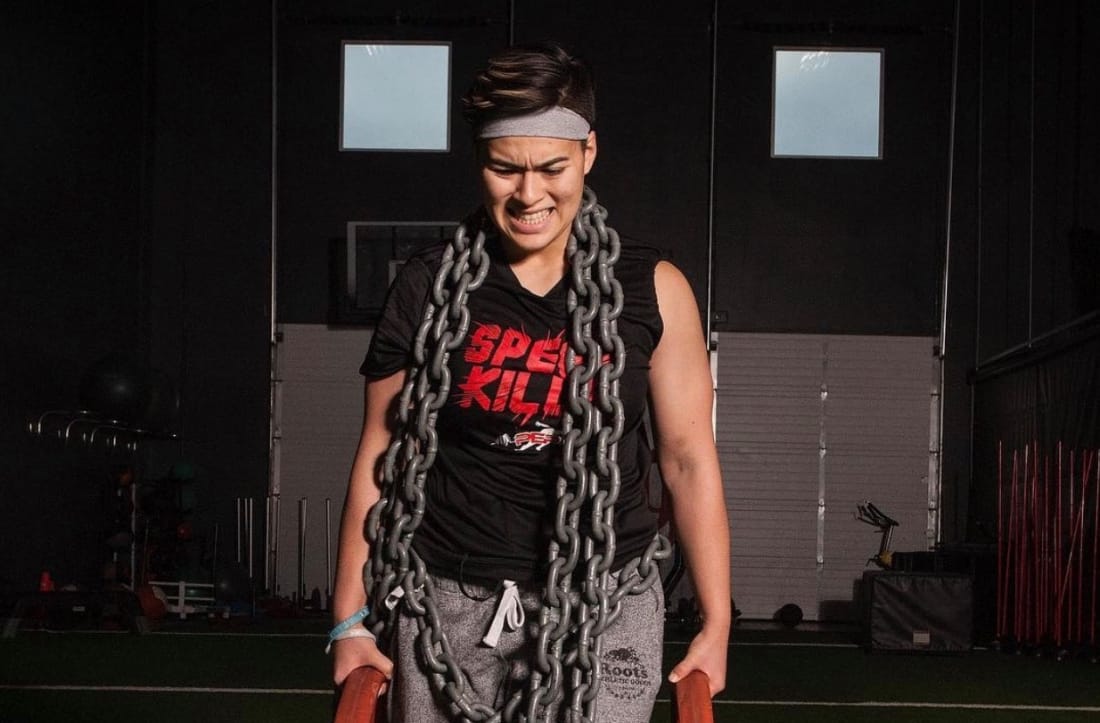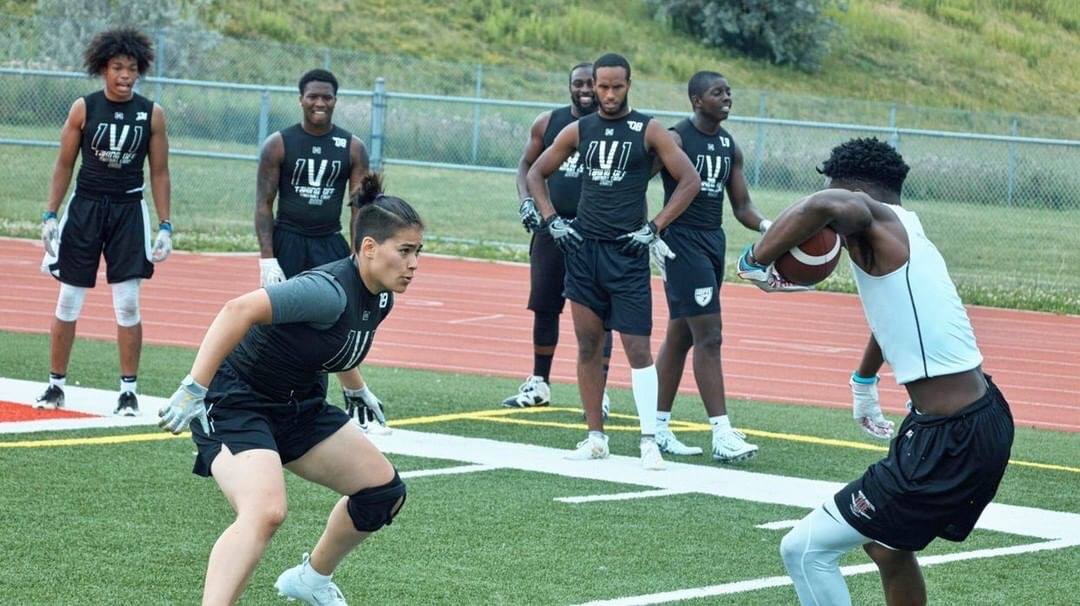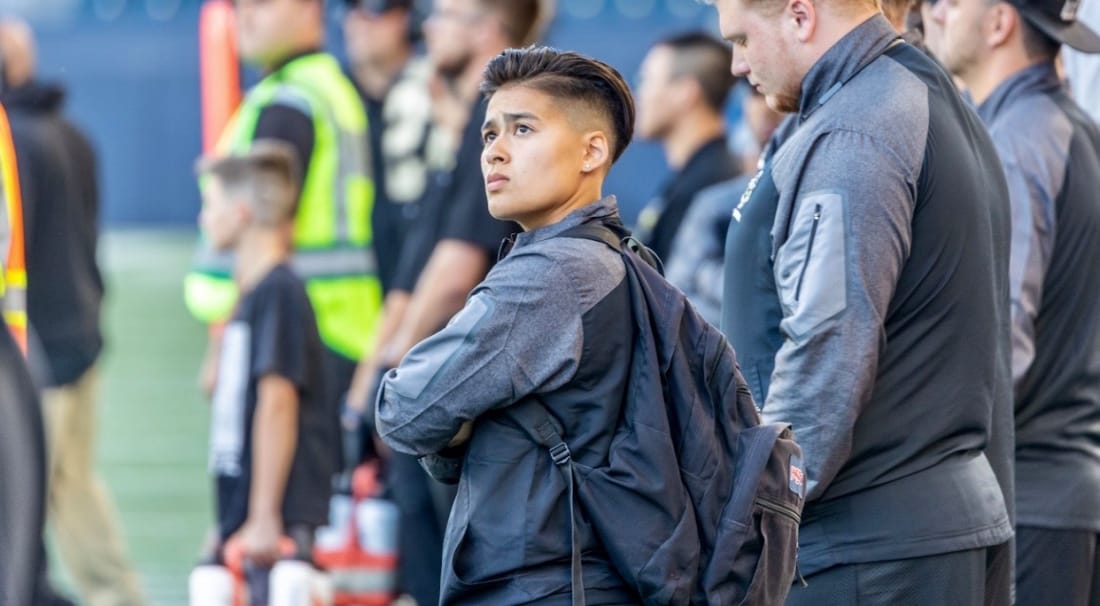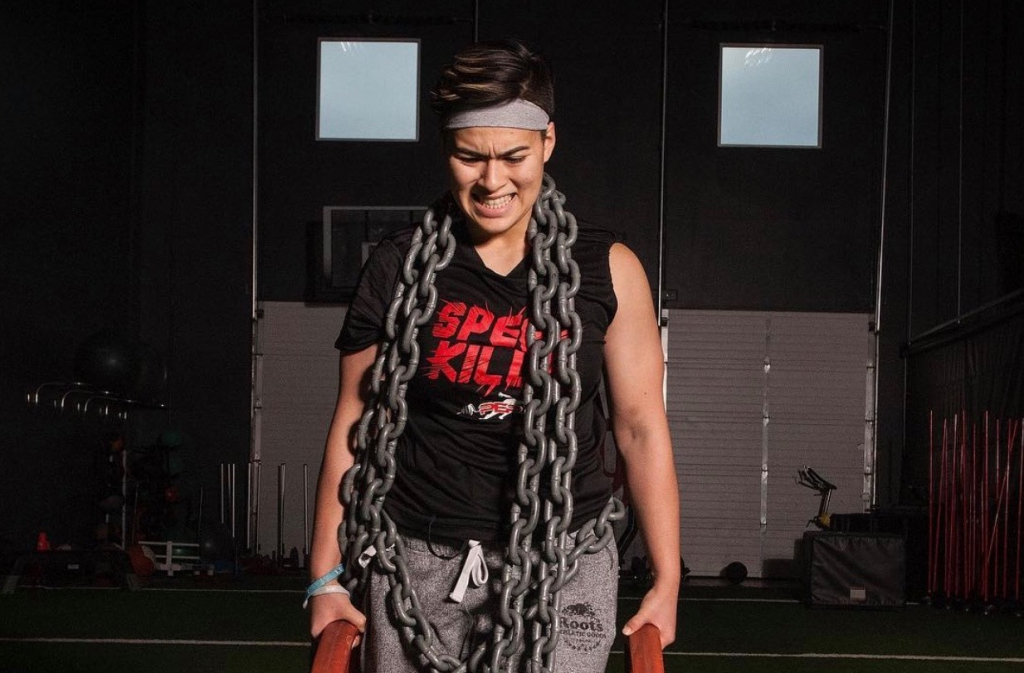
Whether women can, or should be allowed to, compete in men’s contact sports is a hot topic of debate in 2020. Perhaps a better way to frame the conversation is through the women who have proved it’s possible.
If I told you about a Japanese woman making hits in the big leagues of North American college football, you may be expecting a punch line. But as Reina Iizuka, who was born and raised in Toronto, has gone to show, it’s very much a reality: at 19-years-old, she made history becoming the first female to play men’s university tackle football in Canada.
As I talk to Iizuka (now 21) via video chat, clad in her kit at 7am, ready for another socially distanced training session, her enthusiasm for the sport is palpable. Speaking of her introduction to it, she says, “I was in an after-school program at about nine-years-old, and this teacher taught me how to throw a football; I was fascinated by the fact that it spiraled instead of rolled.”
After spending her childhood enthralled by football and playing exclusively for all-male teams, Iizuka joined the University of Manitoba, where she’s now in her final year, having cemented her place on the Manitoba Bison’s roster. But the unprecedented journey was not without its difficulties.
Barriers to Entry

“There were a lot of barriers [to overcome],” Iizuka says, from the usual politics that exist in sport to being benched because she was a girl. “I tore my ACL in grade 12, my recruiting year, when all the coaches are trying to hunt for players for university. Because I faced politics the year before, I didn’t get much playing time, so I had [no video footage] to show them.”
This recruitment stage is one of the most important in a young athlete’s career. High school football players each put together a highlight reel for their prospective university coaches to view. Having no footage should have provided a serious setback. But a lifeline came from Coach Brian Dobie of the Manitoba Bisons, who has been a real mentor in Iizuka’s sporting life.
“A couple of weeks before [my injury], I had met Coach Dobie at showcase camp. I happened to grab his contact and we kept in touch over about a year and a half, and that’s how I ended up going to Manitoba.
“I went into the program in 2017 when my knee was still torn, so I asked Coach Dobie, ‘Can I please just sit in the meeting room, learn the playbook, watch practice, do the weight lifting? Can I just have that experience? I don’t even need to be on the roster.’”
Living by a Japanese Philosophy
Determination is an obvious factor in Iizuka’s success, and she attributes this to her Japanese heritage and home education. “Your home is your core; your foundation… Mine is a very Japanese household: everything is based on Japanese thinking, Japanese philosophy. I have always taken life pretty seriously – I have fun don’t get me wrong – but that’s how I was raised, so I naturally put all my effort into everything I’ve done.”
Yet living in Canada has equally shaped her approach to sport. Acknowledging that Japanese people are renowned for their modesty, she accepts this character trait is tough to reconcile with sporting ambition. “When you’re trying to get recruited [in football] you can’t be modest, you’ve got to sell yourself; don’t be arrogant, but you have to display all of what you are.”
The Size of the Fight in the Dog

Another factor that often comes with the territory of being Japanese is size, or lack thereof. At just 5’7” and 168 pounds, Iizuka is by no means a physical behemoth. This reminds me of a story from my own school days playing rugby. Our coach addressed the changing room full of weary teens before a crack-of-dawn weights session, “Yes, it’s not about the size of the dog in the fight, it’s about the size of the fight in the dog,” he says. “But it helps if you’re a big feckin’ dog.”
This is now the status quo for heavy contact sports like American football and rugby: size is playing an increasing factor, with smaller players facing more struggles than natural specimens. Iizuka echoes this sentiment, “It was only when I entered high school that I felt a [size] difference, but that’s when I started to hit the gym and do weight training… Size is not everything in the game, but that is a legit factor you have to take in.”
As a defensive back, Iizuka’s position also hinges upon speed, tactical positioning, tackle technique and the mental capacity for channeled aggression. These she evidently has in abundance, and she’ll certainly need them if she’s to achieve her future athletic dream: to represent Japan on the international rugby stage.
Rugby and Becoming an Olympian
With so much footballing promise, shifting codes to rugby may seem unwarranted. Iizuka believes it’s a natural transition. “Plus,” she says, “there’s more opportunity in terms of travel; I could live in Japan and play rugby and see my family. There’s also an Olympic platform and a World Cup platform.”
While confident about the transition to another sport, she remains unsure about which position would suit her best. She assures me, however, “I like hitting,” which is indeed a good start.
Beyond the field of play, Iizuka may be able to leave her most enduring mark on sport. She wants to effect change in the area of women’s participation, and admits being a spokesperson for the cause feels like another destination along the path she’s already taken.
“A lot of girls don’t get the opportunity to play sports in general, which is ridiculous. I think promoting sports [for women] and women having these opportunities is important… It doesn’t matter what the sport is; they should all be available to everybody.”









